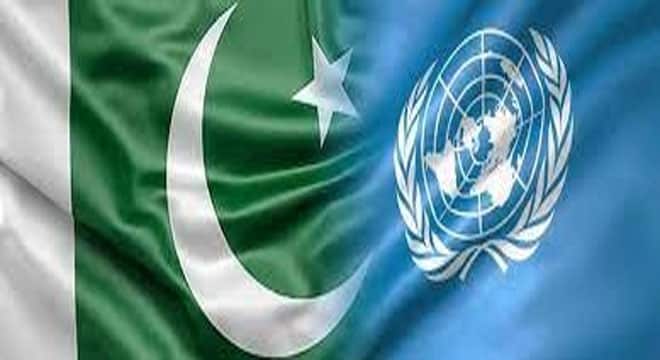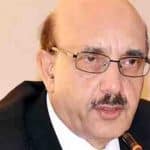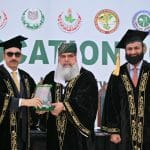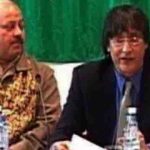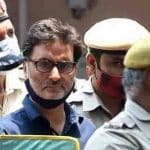NEW YORK, Oct 27 (APP):Speakers at a webinar organized by the Pakistan Mission to the United Nations to mark the ‘Kashmir Black Day’ reaffirmed their support to Kashmiri people in their just struggle for the UN-pledged right to self-determination, with the hope that they will soon achieve freedom from Indian occupation.
“The day marks the start of the great betrayal, when Indian armed forces, in connivance with the Hindu Maharaja, landed in Srinagar to occupy, subjugate, oppress, and terrorize innocent Kashmiris,” Ambassador Munir Akram said in his opening remarks, declaring that Pakistan will standby the Kashmiri people.
“This pattern of brutalities continues with impunity even today,” Ambassador Akram said.
Participating in the webinar on ‘The Great Betrayal: Forcible denial of the right of self-determination to Jammu and Kashmir’ were distinguished speakers, including Riaz Khokhar, a former ambassador to the US and foreign secretary, and Masood Khan, a former ambassador to the UN and until recently president of Azad Kashmir.
Also, taking part were Ghulam Nabi Fai, a prominent Kashmiri leader, Abdelhamid Siyam, a UN correspondent for an Arab newspaper, Lars Rice, Norwegian politician and Marghoob Salim Butt, an OIC official dealing with human rights.
They gave historical perspective and analysis of the Kashmir dispute and underscored the righteousness of the cause, urging for redoubling efforts to end the illegal Indian occupation of the disputed region.
Over the years, continued Ambassador Akram, multiple rounds of bilateral talks on the Kashmir dispute failed due to Indian obduracy. In recent years, he said, India has even refused to revive the composite bilateral dialogue in which the Kashmir dispute is the first agenda item.
The persistent refusal by India to grant the people of Jammu and Kashmir their right of self-determination, as promised in the UN Security Council resolutions, led to popular alienation, he said.
The rigging of the 1987 elections in the Indian occupied Kashmir led to popular protests, he said, adding India killed 100 peaceful protestors in Srinagar on 20 December 1989, igniting the popular freedom struggle of the Kashmiri people.
Since 1989, he said, Indian Occupying forces have killed more than 96,000 Kashmiris, widowed around 23,000 women, raped over 11250 women and girls, and orphaned 108,000.
After 2016 cold-blooded murder of young Kashmiri leader Burhan Wani, the ambassador said, the Indian state terrorism in Kashmir reached unprecedented levels, triggering the UN human rights mechanisms, notable human rights organizations, independent observers, parliamentary bodies, think tanks and the international media took to report most extensively about the appalling state of human rights in Kashmir.
The United Nations High Commissioner for Human Rights published two comprehensive reports (2018 and 2019) on the “despicable” state of human rights in IIOJK, repeatedly calling for establishment of a Commission of Inquiry (COI) to investigate violations of the rights of Kashmiri people.
On 5 August 2019, he said, India proceeded to outright annexation of occupied Jammu and Kashmir in what its extremist rulers have ominously calls a “Final Solution for Jammu and Kashmir. During the last two years, India imprisoned the entire Kashmiri political leadership; illegally detained 13,000 Kashmiri youth; tortured many of them; extra-judicially killed hundreds of young Kashmiri boys; used rape as a weapon of war; put down peaceful protests violently, blinding even young children with pellet guns; imposed collective punishments, by demolishing and burning entire neighborhoods and villages; and curtailed the freedom of religion and expression.
In blatant violation of the Security Council resolutions and international law, Ambassador Akram said India has introduced new and arbitrary domicile rules and 4.2 million fake domicile certificates to change the demographic structure of IIOJK and transform Kashmir’s Muslim majority into a dispossessed and dispersed minority in their own homeland.
He said the recent arrest of over 1400 Kashmiris on false charges in one of the biggest ever crackdowns in Indian occupied Kashmir and the arrest of an allegedly Pakistani individual in New Delhi are part of India’s well-known efforts to divert the world attention from its egregious human rights violations and illegal actions in Kashmir, and well-documented oppression of Muslims and other minorities.
The Indian propaganda only reconfirms Pakistan’s apprehensions that, as it has done in the past, India is plotting false flag operations to blame Pakistan and Kashmiris, the ambassador said.
Neither Pakistan nor Kashmiris can be deterred by propagation of falsehood,” Ambassador Akram said.
After giving detailed background of developments in Kashmir since the 1947 partition of the subcontinent and the gross injustice done to the Kashmiris, Riaz Khokhar called on the international community not to remain indifferent or silent to the “systematic genocide” in Indian occupied Kashmir.
“India must be stopped by the international community from going ahead with the demographic changes,” he said, adding the Kashmiris are only asking for their basic rights, assured to them by the UN.
“The sad situation is and the irony is that the greatest violator of the UN Security Council resolutions is offering itself as a candidate for a permanent seat at the United Nations Security Council,’ Khokhar said. Similarly, it is tragic, that the greatest violator of human rights should be elected to the Human Rights Council by a thumping majority.
“What has happened to the conscience of the international community which we is a regional is a recognized international dispute,” he asked. “It’s not an internal matter of India nor just a bilateral issue between India and Pakistan. No bilateral agreement can supersede or circumscribe the authority of the United Nations.”
In conclusion, Khokhar said that “legally, politically and under all criteria, Pakistan’s case and the case of the people of Jammu and Kashmir is impregnable, and we must continue with our full out support for the Kashmiri people”.
Masood Khan, former Azad Kashmir President, also gave a detailed background of the Kashmir dispute, and said in an emotion charge voice that the Indian occupied Jammu and Kashmir today is wrapped in a pall of darkness and blackness of military siege.
“This is military siege,” he said.
Masood Khan called for continue engagement with the international community in an effort to move forward in a systematic manner. “I would say that it was a huge success of Pakistan,” he said referring to sharply critical editorials and op-eds and television programmes and reporting in the wake of the India’s annexation of the disputed region on Aug 5, 2019.
“Everybody saw India’s real face and I think that the Prime Minister of Pakistan’s speech at the United Nations and, I along with Ambassador Munir Akram had the opportunity of listening to it directly, was fantastic because he spoke from the heart.
What was required now, Masood Khan said, was efforts to take the United States on board so as to create some movement after all efforts to engage India had failed.
Pakistan must continue to engage with the civil society in order to build up support
for the Kashmir cause, he said.
“Last point, very last point, make Pakistan stronger and liberate the Indian occupied
Kashmir.”
Also giving historical perspective of Indian occupation of Kashmir, Dr.Ghulam Nabi Fai thanked United Nations Secretary-General Antonio Guterres who articulated U.N.’s principal policy three days after India’s illegal annexation of the disputed territory — that the dispute should be resolved under the Charter and under applicable Security Council resolutions.
Welcoming the reiteration of the UN’s position on Kashmir, he underscored the need for folow up action.
Fai said this was the time for him to intervene and to bring the parties — India, Pakistan and Kashmiris — together for dispute resolution.
Journalist Abdelhamid Siyam, who is a Palestinian, said that Kashmir and Palestinian issues were identical.
“I feel your pain and suffering more than the average fellow supporters; we have so much in common dear Kashmir, brothers and sisters.
“In fact, the beginning of the catastrophes of both Palestine and Kashmir almost identical. The British colonial rule is primarily responsible for our tragedies.” he added.
Siyam added, “We should not depend only on the international community. We should not expect the UN to go and establish a Palestinian state, it will not happen in Kashmir as well.
“Occupation has to be costly. The minute the occupation becomes very costly at all levels, financial, economic, human, the occupying power might start revising its own position.
Without making the occupation costly, I don’t think we will win.”
Lars Rice, Norwegian politician and Marghoob Salim Butt, an OIC official dealing with human rights, also spoke on the various aspects of the Kashmir dispute and voiced support for their right to self-determination.
Follow the PNI Facebook page for the latest news and updates.


